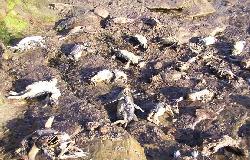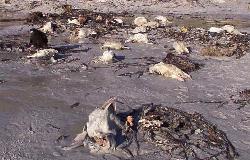

Falklands Penguins Starve to Death






At least 100,000 penguins died from starvation during May 2002 in the Falkland Islands. Penguin colonies throughout the Falklands were littered with dead penguins, some fresh, some partially decayed with bones protruding. All had died during their annual moult. Their condition and weight showed that they had all died as a result of starvation.
Rockhopper and Gentoo penguins were the worst affected, with Magellanic penguins and cormorants also dying. The worst affected areas were along the north of the islands, where 50% of the Rockhopper penguin population and 10% of the Gentoo penguin population died.
Some birds barely alive, still undergoing their moult in June, were too weak to walk. Vultures and caracaras followed them around waiting for them to die. The Rockhoppers average weight was under 2kg and Gentoos just 4kg. But why did so many penguins die during the course of a few weeks?
When penguins change their feathers, they loose their insulation, making it impossible to enter the icy cold ocean to feed for about three weeks. Penguins fatten themselves up during February and March ready for the moult, but if food is too scarce during this period, they are in trouble.
Without enough fat reserves to survive three weeks without food they are doomed, like a car setting out on a 100 mile journey without enough petrol. When the fuel runs out, the motor stops, and the penguin dies. The same thing occurred in 1986, when over a million Rockhopper penguins starved to death in exactly the same manner.
Mass starvation of adults is not the only evidence of food shortage around the Falklands. Penguin chicks also starve to death by the thousand every year in the Falklands. A joint research project between the Environmental Research Unit, the Organisation for the Conservation of Penguins, the Chilean government, and the Argentine government, shows that penguin chicks in Chile and Argentina do not starve in large numbers like they do in the Falklands. In addition, there is evidence that some penguins have even moved from the Falklands to Argentina and Chile, where food is more plentiful.
The nearest Rockhopper penguin colony to the Falklands is on Staten Island in Argentina. Populations increased rapidly on Staten Island during the 1990s, whilst populations in the Falklands crashed. The population increase on Staten Island was so rapid that it cannot be explained by breeding success alone, suggesting that Rockhopper penguins have been moving there from somewhere else. The only likely source for so many Rockhoppers was the Falkland Islands.
A few years ago Gentoo penguins did not breed anywhere in South America, but during the 1990s, when Gentoo penguins were declining in the Falklands, two small colonies appeared in Argentina. With no other Gentoos in South America, the only nearby source was the Falkland Islands.
Magdalena Island in Chile, and Cabo Virgenes in Argentina, are the nearest colonies of Magellanic penguins to the Falklands. Both have increased rapidly over recent years, whilst the nearby Falklands' colonies have crashed. Many years ago commercial fishing was allowed around Magdalena Island, and the penguins declined. Then the Chilean government declared Magdalena Island a nature reserve, and established a no-fishing zone around the island, since when penguin populations have flourished. Unfortunately the Falkland Islands Government have still not established any protective measures in Falklands waters, and the differences are striking.
Magellanic penguins in Chile and Argentina, where no-fishing zones have been established, can find food for their chicks in just 14 hours. By comparison, Magellanic penguins in the Falklands, where commercial fishing still occurs close to penguin colonies, need an average of over 34 hours - more than twice as long to find the same quantity of food.
With chicks in the Falklands receiving less than half the amount of food, it is not surprising that most of them starve. In both Chile and Argentina an average of 1.4 chicks per nest survive, whilst in the Falklands it is around 0.5 chicks per nest. The reason for such low reproductive success is that most chicks in the Falklands die from starvation every year.
In 1982, British troops sent to the Falklands were told they were liberating an island of 2,000 people and 6 million penguins, a figure supported by the ICBP (Status and Conservation of Seabirds at the Falkland Islands) in 1984. These 6 million penguins have crashed to less than 1 million over the last 20 years, due to insufficient fish and squid around the Falklands. This coincides with the establishment of a squid and fishing industry around the Falklands. Falkland Islands Sealions and Elephant seals which also rely on fish and squid have also crashed in number over recent years.
In September 2000, the Spheniscus Penguin Conservation Group, and the International Penguin Conservation Work Group, called for a 30 mile exclusion zone around penguin colonies world-wide. So far the Falkland Islands Government have not implemented this protection, and penguins continue to starve.
If the Falkland Islands Government were to impose a no-fishing zone around penguin colonies, then it would help penguins to recover, as occurred when Chile introduced such measures. Such a no-fishing zone would reduce the available fishing grounds in the Falklands by less than 3% - hardly a dramatic financial loss to a government with an annual income of US$30,000 per man, woman and child. If countries such as Chile and Argentina can protect their penguins in such a manner, then why can't the Falklands?
The Falklands's response was to try and stop our work by false arrests, intimidation, withdrawal of work permits and death threats. The Falkland Islands Government were taken to the Supreme Court and found guilty of human rights abuse which the judge described as "morally and constitutionally indefensible". (Click here to read about our Supreme Court victory)
.
.
.